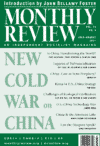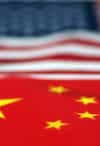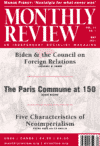
The Long Haitian Revolution
The current situation in Haiti has roots in the historical struggle of the Haitian people, and is part of the endless retribution from imperial powers for its revolution. | more…

The current situation in Haiti has roots in the historical struggle of the Haitian people, and is part of the endless retribution from imperial powers for its revolution. | more…

South Africa’s COVID-19 pandemic is one of racial capitalism, entangled with histories of imperial state formation, settler colonialism, and a hierarchical, global-neoliberal public policy architecture. | more…

Forthcoming in June 2021
In March 2015, President Obama initiated sanctions against Venezuela, declaring a “national emergency with respect to the unusual and extraordinary threat to the national security and foreign policy of the United States posed by the situation in Venezuela.” Each year, the U.S. administration has repeated this claim. But, as Joe Emersberger and Justin Podur ague in their timely book, Extraordinary Threat, the opposite is true: It is the U.S. policy of regime change in Venezuela that constitutes an “extraordinary threat” to Venezuelans. Tens of thousands of Venezuelans continue to die because of these ever-tightening U.S. sanctions, denying people daily food, medicine, and fuel. On top of this, Venezuela has, since 2002, been subjected to repeated coup attempts by U.S.-backed forces. In Extraordinary Threat, Emersberger and Podur tell the story of six coup attempts against Venezuela. | more…

This special issue of Monthly Review is devoted to the New Cold War on China. What has been the view of the Chinese Revolution presented in Monthly Review in the past seven decades? How has it changed over time? As Paul A. Baran observed: “Marx and in particular Lenin being master-tacticians shifted horses and arguments as conditions changed (rightly so, to be sure!)” The question then becomes not the changing views themselves, but how these shifts in perspective reflect changing historical circumstances. | more…

The imperialist world system, crowned by U.S. hegemony, is now threatened by China’s seemingly inexorable rise and pursuit of its own distinctive sovereign project. In this respect, the Trump administration’s prosecution of a New Cold War on China was no anomaly, but rather the inevitable U.S. response to China’s rise and the end of Washington’s unipolar moment. The Biden administration has made it clear that it not only intends to continue the New Cold War, but to accelerate it. | more…

Whether China has become an imperialist country is a question of crucial importance for the global class struggle. Although China has developed an exploitative relationship with South Asia, Africa, and other raw material exporters, on the whole, China continues to transfer a greater amount of surplus value to the core countries in the capitalist world system than it receives from the periphery. China is thus best described as a semi-peripheral country in the capitalist world system. | more…

U.S. fantasies of expansion, commercial dominion, and military prowess have long hinged on a premise of Pacific exceptionalism. Couched in the millenarian language of manifest destiny, the Pacific region and its multitudinous ecosystems, cultures, peoples, and nations have been vacated in favor of an aqua nullius that frames the region as an empty space designated for U.S. possession by divine providence. | more…

The war against fascism was transformed into the Cold War. U.S. imperialism, subdued somewhat by post-First World War isolationism, came into full flower. Washington implemented this sea change in many ways, including the division of the Korean Peninsula. | more…
U.S. sanctions killed tens of thousands of Venezuelans before the recognition of Juan Guaidó as interim president in 2019 led to even more murderous sanctions. The message is that tremendous economic pain will be inflicted on the country until Nicolás Maduro is gone. | more…

The COVID-19 pandemic is at its root a crisis of globalization, racial capitalism, colonialism, the social organization of our public health system. It is a crisis of treatment and care versus demonization and wall building. And it is the latest pandemic in a long line of modern onesÑfrom SARS to swine flu to HIV to EbolaÑa predictable and predicted outcome, not the mysterious unforeseeable lightning strike as it is often portrayed. | more…

We who are engaged in the struggle for change might ask: “Through what lens of refraction is the evidence of events recalled and related?” If we are to resist the genocidal use of military force, and to oppose the environmental depredation that follows in its wake, we need to see the roots and laws of motion of colonialism and empire | more…

In 1884, important figures in England’s budding socialist movement broke with the Social Democratic Federation over concealed jingoism and strong support for the British Empire. A similar division within the broad left on the issue of imperialism is threatening to reappear in our time. | more…
Notifications